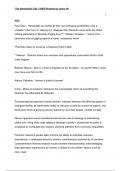Summary
Summary Comprehensive study resource: 'The Handmaid's Tale'
A/A* resource providing an exceptional guide for understanding Atwood's novel, 'The Handmaid's Tale' - covering every assessment objective required for A Level English Literature! It offers perceptive, assured, and sophisticated notes. The resource delves deeply into Atwood's authorial methods, ...
[Show more]



